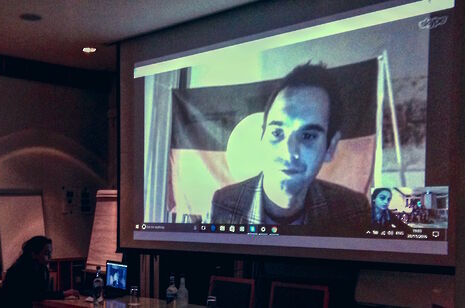‘Weaponise your privilege’: blocked Aboriginal Australian speaker addresses students by Skype
Roxley Foley addresses Cambridge students on the need decolonise the self and use their privilege to help indigenous movements

Even before Roxley Foley had said anything on his chosen topic –‘Decolonising Australia’ – at Pembroke last Wednesday, his absence spoke volumes.
Arriving at the airport in London on November 25, he was detained and questioned by the UK Border Force. He was held in a cell overnight and then put on the first flight back to Germany. Anxious and bewildered, his friends and family observed the events unfolding on Facebook. To one incredulous post – “but why?” – Roxley wrote a frank summation of what had transpired: “Black man entering UK to speak on Australian human rights violations a few weeks after he drew mass amounts of bad press on one of their most beloved institutions [the British Museum].”
Roxley, a Gumbaynggirr man from Nambucca Heads and Sacred Fire Keeper at the Aboriginal Tent Embassy, had indeed been in the UK only weeks before as part of an indigenous contingent endorsed by the Australian Senate, campaigning for the repatriation of artefacts stolen by Captain Cook from his first encounter with Aboriginal Australians on the shores of Botany Bay in 1770 – artefacts that today on display at the British Museum in London and the Cambridge Museum of Anthropology and Archaeology. Not only did this contingent leave empty-handed, Roxley, who remained behind, was then refused re-entry to the UK from Germany to deliver the remaining lectures he had scheduled.
The very fact of his speaking from Berlin over Skype to the intimate gathering in the Pembroke Nihon Room provided a striking point of departure – namely, the difference between the German and British historical consciousness. “A few days before the anniversary of the fall of the Berlin wall,” he said, “in another country, a man was elected who promised to put up a new wall.” Wandering among the grey stelae at the Holocaust Memorial in Berlin, Roxley reflected that: “So many parallels can be found to our story back home one can’t help but contemplate a little. Although the history of wartime Germany can be a touchy subject it is not a history that is hidden or avoided nor can the physical scars of the landscape and people be denied.
“It is my belief that a memory of these times is what has kept Germany from following other European nations towards the drift of hard right conservative neoliberal nationalism which is so alarmingly on the rise.”
And that evening Roxley did not hide or avoid the history of Australia. With catholicity, passion, and composure, he connected the brazen cupidity of the Australian mining industry, the perils of ‘ecocide’, the militarisation of Australian borders, and the enduring spectre of settler-colonialism. He spoke at length about the disproportionate incarceration of Aboriginals Australians – the rates of which, for children in Western Australia, are the highest in the world, more than fifty-two times greater than incarceration rates for non-indigenous children.
Yet, throughout this discussion, he returned to the praxis of decolonisation, a theme he introduced by screening the widely shared YouTube video ‘Educate YOURSELF, then educate the people’ (2010) by his father, Gary Foley, who is himself a renowned indigenous Australian activist.
“Use what tools you have, and bring them to the movement”
There Gary urges potential allies of indigenous movements – or, to use Roxley’s preferred term, accomplices – to first educate themselves, to “become fully aware of just how little you know.” Decolonisation then begins with the decolonisation of the self, the giving up of the conceit of what Teju Cole calls the White Savior Industrial Complex, in which one’s concern is less with justice than a personal need for some “big emotional experience that validates privilege.” Because, as Gary points out, “if you’re fair dinkum about achieving social change your agenda is much bigger than us and across all of those issues you’ve got to be constantly educating yourself.” Decolonisation, in other words, is a centrifugal force; it compels us to at once take up many, intersecting struggles for justice.
There were some questions for Roxley in what little time we had at Pembroke over Skype, and one of them came from a member of Cambridge Defend Education, who asked, given Roxley’s plea for self-education, what can we, in a secluded and privileged place like University of Cambridge, do for decolonisation? In answering the question, Roxley referred to the “fake primitivism of hippies at Standing Rock”; those people who had shown up pretending to have “given up their privilege in order to recover some dubious authenticity.”
The point, according to Roxley, is not to surrender, but “to weaponise your privilege.” As the gathering drew to a close he urged the crowd “to use what tools you have, and bring them to the movement.”
 News / SU reluctantly registers controversial women’s soc18 December 2025
News / SU reluctantly registers controversial women’s soc18 December 2025 Features / Should I stay or should I go? Cambridge students and alumni reflect on how their memories stay with them15 December 2025
Features / Should I stay or should I go? Cambridge students and alumni reflect on how their memories stay with them15 December 2025 News / Dons warn PM about Vet School closure16 December 2025
News / Dons warn PM about Vet School closure16 December 2025 News / Cambridge study finds students learn better with notes than AI13 December 2025
News / Cambridge study finds students learn better with notes than AI13 December 2025 News / Uni registers controversial new women’s society28 November 2025
News / Uni registers controversial new women’s society28 November 2025








